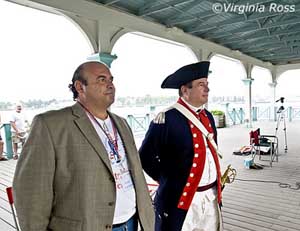There seem to be two Anthony Weiners: one is the master of one-liners that could have made him a marquee Vegas act and who is almost always to be found at the center of any major political scrum.
The other is a kind of stolid legislative handyman who tirelessly tinkers with some bit of technical, unromantic lawmaking, wheeling and dealing to get something done that will never make big headlines, but is truly useful in the the ultimate reckoning. On the day after April fools, President Obama signed a quiet little bill called “The Prevent All Cigarette Trafficking Act (PACT) of 2009”
The bill was sponsored by Weiner, and has the purpose of cracking down on tobacco smuggling and the selling of cigarettes via the internet, in part to make sure New York City and State receive their proper share of tobacco taxes.
The only real attention Weiner received for actually getting a bill through the most bitterly divided Congress in recent memory was a fair amount of hate from Native American’s who have been plying the tax-free cigarette trade for many decades.
He did get a shout-out of dubious political value from Mayor Bloomberg, delivered by Bloomberg’s corporation counsel Michael A. Cardozo.
But the bill that makes the selling of tobacco in violation of state tax law a felony and outlaws the shipping of tobacco through the US Postal Service is useful.
The New York State Department of Tax and Finance has estimated that the state loses up to $500 million from untaxed Internet tobacco sales and that the city may lose as much as $150 million. Also interestingly, the Government Office of Accountability reports that Hezbollah somehow earned $1.5 million from the sale of illegal tobacco between 1996-2000.
Weiner says his law “will give states and localities a major revenue boost by cracking down on the illegal sale of tobacco and close a major source of finances for international terrorists and criminals. Every day we delay is another day that New York loses significant amounts of tax revenue and kids have easy access to tobacco products sold over the internet.”
Despite its usefulness the legislation did not gain Weiner entree to any talk shows to discuss it’s virtues, but thats why he practices his stand up routines.
 It must have sounded strange to New York City residents who woke up last week and heard a local wanna-be politician bash the Democratic congress on a Fox 5 morning show. But that’s exactly what they got when Staten Island’s Republican challenger to Mike McMahon made an appearance on the program.
It must have sounded strange to New York City residents who woke up last week and heard a local wanna-be politician bash the Democratic congress on a Fox 5 morning show. But that’s exactly what they got when Staten Island’s Republican challenger to Mike McMahon made an appearance on the program.
 Across the nation, about 300 million people are marking this time of year a special occasion. Unlike Easter or Passover, this holiday is celebrated only once every ten years, and in its spirit everyone’s participation is more than welcomed.
Across the nation, about 300 million people are marking this time of year a special occasion. Unlike Easter or Passover, this holiday is celebrated only once every ten years, and in its spirit everyone’s participation is more than welcomed.
 Jamie Oliver is doing it. Michelle Obama is doing it. And now Yvette Clarke is doing it.
Jamie Oliver is doing it. Michelle Obama is doing it. And now Yvette Clarke is doing it.